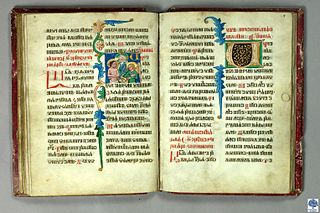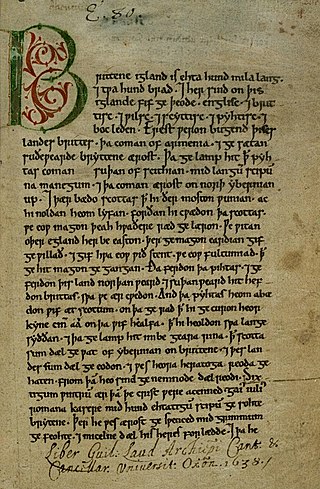Related Research Articles
Old English literature refers to poetry and prose written in Old English in early medieval England, from the 7th century to the decades after the Norman Conquest of 1066, a period often termed Anglo-Saxon England. The 7th-century work Cædmon's Hymn is often considered as the oldest surviving poem in English, as it appears in an 8th-century copy of Bede's text, the Ecclesiastical History of the English People. Poetry written in the mid 12th century represents some of the latest post-Norman examples of Old English. Adherence to the grammatical rules of Old English is largely inconsistent in 12th-century work, and by the 13th century the grammar and syntax of Old English had almost completely deteriorated, giving way to the much larger Middle English corpus of literature.

A scribe is a person who serves as a professional copyist, especially one who made copies of manuscripts before the invention of automatic printing.

The Junius manuscript is one of the four major codices of Old English literature. Written in the 10th century, it contains poetry dealing with Biblical subjects in Old English, the vernacular language of Anglo-Saxon England. Modern editors have determined that the manuscript is made of four poems, to which they have given the titles Genesis, Exodus, Daniel, and Christ and Satan. The identity of their author is unknown. For a long time, scholars believed them to be the work of Cædmon, accordingly calling the book the Cædmon manuscript. This theory has been discarded due to the significant differences between the poems.

Thomas Hoccleve or Occleve (1368/69–1426) was a key figure in 15th-century Middle English literature, significant for promoting Chaucer as "the father of English literature", and as a poet in his own right. His poetry, especially his longest work, the didactic work Regement of Princes, was extremely popular in the fifteenth century, but went largely ignored until the late twentieth century, when it was re-examined by scholars, particularly John Burrow. Today he is most well known for his Series, which includes the earliest autobiographical description of mental illness in English, and for his extensive scribal activity. Three holographs of his poetry have survived, and he also copied literary manuscripts by other writers. As a clerk of the Office of the Privy Seal, he wrote hundreds of documents in French and Latin.
The Dialogue on Translation between a Lord and a Clerk, or Dialogus inter dominum et clericum, was written by John Trevisa. Along with the dedicatory Epistle, it forms the introduction to his 1387 translation of the Polychronicon of Ranulf Higden, commissioned by Trevisa's patron, Lord Berkeley. Written in Middle English, it consists of a series of arguments made by the clerk on why books should not be translated from learned languages such as Latin, each one followed by a rebuttal from the lord. The clerk eventually agrees, and the exchange concludes with a prayer for guidance in the translation.

Codicology is the study of codices or manuscript books. It is often referred to as "the archaeology of the book," a term coined by François Masai. It concerns itself with the materials, tools and techniques used to make codices, along with their features.

The term "chancery hand" can refer to either of two distinct styles of historical handwriting.

Sir Roger Aubrey Baskerville Mynors was an English classicist and medievalist who held the senior chairs of Latin at the universities of Oxford and Cambridge. A textual critic, he was an expert in the study of manuscripts and their role in the reconstruction of classical texts.

The Anglo-Saxon Chronicle is a collection of annals in Old English, chronicling the history of the Anglo-Saxons.

Cædmon's Hymn is a short Old English poem attributed to Cædmon, a supposedly illiterate and unmusical cow-herder who was, according to the Northumbrian monk Bede, miraculously empowered to sing in honour of God the Creator. The poem is Cædmon's only known composition.

Codex Marchalianus, designated by siglum Q, is a 6th-century Greek manuscript copy of the Greek version of the Hebrew Bible known as the Septuagint. It is now in the Vatican Library. The text was written on vellum in uncial letters. Palaeographically it has been assigned to the 6th century. Marginal annotations were later added to the copy of the Scripture text, the early ones being of importance for a study of the history of the Septuagint.

Frithegod, was a poet and clergyman in the mid 10th-century who served Oda of Canterbury, an Archbishop of Canterbury. As a non-native of England, he came to Canterbury and entered Oda's service as a teacher and scholar. After Oda's death he likely returned to the continent. His most influential writing was a poem on the life of Wilfrid, an 8th-century bishop and saint, named Breviloquium Vitae Wilfridi. Several manuscripts of this poem survive, as well as a few other of Frithegod's poems. He was also known for the complexity of his writings, with one historian even calling them "damnably difficult".
Roberto Weiss was an Italian-British scholar and historian who specialised in the fields of Italian-English cultural contacts during the period of the Renaissance, and of Renaissance humanism.
Neil Ripley Ker was a scholar of Anglo-Saxon literature. He was Reader in Palaeography at the University of Oxford and a fellow of Magdalen College, Oxford until he retired in 1968. He is known especially for his Catalogue of Manuscripts Containing Anglo-Saxon, which is praised as a milestone in Anglo-Saxon manuscript study.
Leighton Durham Reynolds was a British Latinist who was known for his work on textual criticism. Spending his entire teaching career at Brasenose College, Oxford, he prepared the most commonly cited edition of Seneca the Younger's Letters.

Julia Catherine Crick, is a British historian, medievalist, and academic. She is Professor of Palaeography and Manuscript Studies at King's College London.
Norman Francis Blake was a British academic and scholar specialising in Middle English and Early Modern English language and literature on which he published abundantly during his career.

John Shirley was an author, translator, and scribe. As a scribe of later Middle English literature, he is particularly known for transcribing works by John Lydgate and Geoffrey Chaucer.
Eleanor Prescott Hammond (1866–1933) was an American scholar of English literature, particularly Chaucer studies. She was born in Worcester, Massachusetts, which she left to study at the University of Leipzig. She then studied at Oxford under Arthur Sampson Napier, earning her B.A. in 1894. She obtained a Ph.D. at the University of Chicago in 1898, then taught there in the English department before leaving to become a schoolteacher and independent scholar. She also taught at Wellesley College. She never married, and died in Boston in 1933.
Emily Steiner is the Rose Family Endowed Chair Professor of English at the University of Pennsylvania. She is known for her work on medieval literature and middle English literature and culture.
References
- 1 2 "Professor Daniel Wakelin FBA". British Academy. Retrieved 27 February 2024.
- ↑ "Wakelin, Prof. Daniel Leslie" . Who's Who . A & C Black. 2023. doi:10.1093/ww/9780199540884.013.U254692 . Retrieved 27 February 2024.(Subscription or UK public library membership required.)
- 1 2 3 "Professor Daniel Wakelin". St Hilda's College, Oxford. Retrieved 27 February 2024.
- ↑ "Professor Daniel Wakelin". University of Oxford. Retrieved 27 February 2024.
- ↑ Dane, Joseph A. (2010). "Daniel Wakelin, Humanism, Reading, and English Literature, 1430–1530. Humanism, Reading, and English Literature, 1430–1530. Daniel Wakelin . Oxford: Oxford University Press, 2007. Pp. xii+254". Modern Philology . 108 (2). Chicago: The University of Chicago Press: E91–E94. doi: 10.1086/656516 . ISSN 0026-8232.
- ↑ Lerer, Seth (16 March 2016). "Book Review: Scribal Correction and Literary Craft: English Manuscripts 1375–1510. Daniel Wakelin. Cambridge: Cambridge University Press, 2014. Pp. xviii+345". Modern Philology. 113 (4). Chicago: The University of Chicago Press. doi: 10.1086/684755 . ISSN 0026-8232.
- ↑ Critten, Rory G. (2015). "Scribal Correction and Literary Craft: English Manuscripts 1375–1510 by Daniel Wakelin (review)". Studies in the Age of Chaucer . 37. Coral Gables, Florida: The New Chaucer Society: 332–335. doi:10.1353/sac.2015.0021. ISSN 1949-0755.
- ↑ Johnston, Michael (27 February 2023). "Daniel Wakelin. Immaterial Texts in Late Medieval England: Making English Literary Manuscripts, 1400–1500. Pp. xv+284. Cambridge: Cambridge University Press, 2022. Hardback, £75". The Review of English Studies . 74 (314). Oxford: Oxford University Press: 355–357. doi:10.1093/res/hgad013. ISSN 1471-6968.